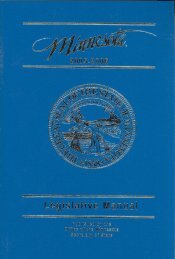Consultant's Report - Minnesota State Legislature
Consultant's Report - Minnesota State Legislature
Consultant's Report - Minnesota State Legislature
Create successful ePaper yourself
Turn your PDF publications into a flip-book with our unique Google optimized e-Paper software.
MINNESOTA DEPARTMENT OF NATURAL RESOURCES<br />
Feasibility Study to Limit the Spread ofZebra Mussels from Ossawinnamakee Lake<br />
monitoring procedures, specific objectives. that relate to management of the current lake<br />
population are recommended in Section VI.<br />
Table V-2. Summary of Potential Management Alternatives<br />
Type of Management<br />
Alternative<br />
Prevention through Education<br />
and Public Outreach<br />
Detection and Monitoring<br />
Rapid Response Alternatives<br />
Tolerance ofANS<br />
Implementation ofControl<br />
Methods<br />
Impletmentation and/or Maintenance Issues<br />
It is important to educate the public and recreational users<br />
about the impacts ofzebra mussels and guidelines that can<br />
be followed to aid in prevention ofspreading.<br />
Proper equipment and training must be provided for<br />
appropriate personnel to facilitate early detection and<br />
regular monitoring procedures.<br />
A coordinated rapid response plan must be developed that<br />
can aid management personnel in the event ofdetection or<br />
establishment ofzebra mussels.<br />
Management plans must address the systems tolerance of<br />
zebra mussels in order to determine ifprevention or<br />
elimination procedures are required.<br />
Specific technological, physiological, or biological control<br />
methods can be implemented to control the spread of<br />
zebra mussels.<br />
Prevention through Education and Public Outreach<br />
It is important to promote public awareness and understanding of zebra mussels and their<br />
potep.tial impacts to the ecological and economic health of Ossawinnamakee Lake, Pelican<br />
Brook, Pine Brook, and the Upper Mississippi River. Outreach programs that promote<br />
commercial and recreational practices to prevent the spread of zebra mussels are also important.<br />
These practices include the proper disposal of live bait, inspection of any boats or other<br />
equipment that is placed in infested waters, and proper cleaning procedures for removal ofzebra<br />
mussels. In addition, frequent boaters should be educated on anti-fouling paints and coatings<br />
that can be utilized to prevent zebra mussel attachment.<br />
The ANS Task Force public awareness campaign in an effort to control recreational spread of<br />
aquatic nuisance species has initiated the program entitled "Stop Aquatic Hitchhikers." This<br />
program encourages recreational users to not only identify ANS present in their surroundings,<br />
but also follow a short list of guidelines every time they leave a lake, stream or coastal area.<br />
Figure V-3 gives a short de,scription ofthese guidelines.<br />
V-16<br />
Review oCPotential Control Methods
















